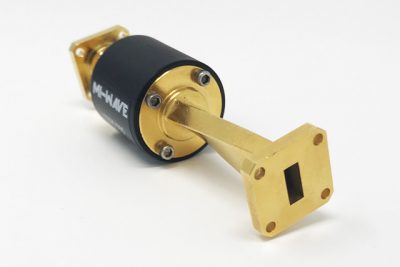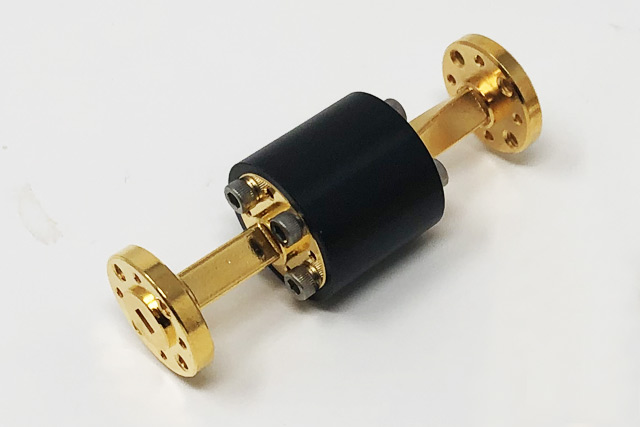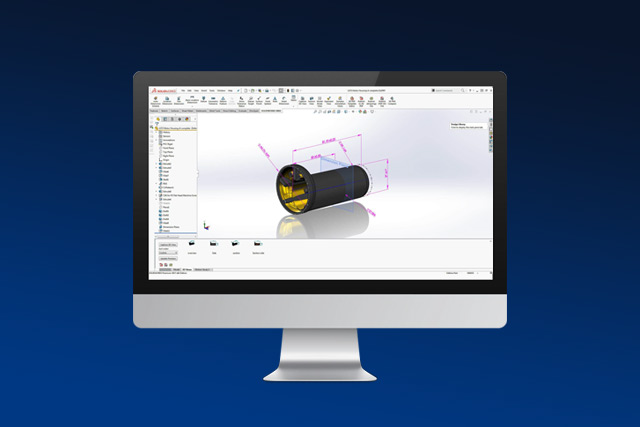Mi-Wave’s 115 series uses the Faraday principle of rotation in a broadband dielectric waveguide design to achieve high isolation across full waveguide bands. High-quality ferrite material is used in these isolators, and the magnetic field is produced by an integral permanent magnet. To ensure maximum reproducibility and performance, a combination of precise machining operations and refined assembly techniques are used.
These Faraday isolators are available in standard waveguide sizes from 18.0 to 325 GHz

| Model Number | Frequency min. (GHz) | Frequency max. (GHz) | Isolation (dB) | Insertion Loss (dB) typical | VSWR max. | Power Handling CW (Watts max.) | Input Port | Output Port | LINK |
|---|---|---|---|---|---|---|---|---|---|
| 115K/595 | 18 | 26.5 | 25 | 1 | 1.30:1 | 2 | WR-42 Waveguide, UG-595/U Flange | WR-42 Waveguide, UG-595/U Flange | |
| 115(34)/595 | 22 | 33 | 25 | 1 | 1.30:1 | 2 | WR-34 Waveguide, UG-595/U Square Flange | WR-34 Waveguide, UG-595/U Square Flange | |
| 115(34)/381 | 22 | 33 | 25 | 1 | 1.30:1 | 2 | WR-34 Waveguide, UG-381/U Round Flange | WR-34 Waveguide, UG-381/U Round Flange | |
| 115A/599 | 26.5 | 40 | 25 | 1.2 | 1.30:1 | 2 | WR-28 Waveguide, UG-599/U Square Flange | WR-28 Waveguide, UG-599/U Square Flange | |
| 115B/383 | 33 | 50 | 25 | 1.3 | 1.30:1 | 1.5 | WR-22 Waveguide, UG-383/U Round Flange | WR-22 Waveguide, UG-383/U Round Flange | |
| 115U/383 | 40 | 60 | 25 | 1.5 | 1.30:1 | 1.5 | WR-19 Waveguide, UG-383/U-M Round Flange | WR-19 Waveguide, UG-383/U-M Round Flange | |
| 115V/385 | 50 | 75 | 25 | 1.7 | 1.30:1 | 1 | WR-15 Waveguide, UG-385/U Round Flange | WR-15 Waveguide, UG-385/U Round Flange | |
| 115E/387 | 60 | 90 | 25 | 2 | 1.35:1 | 1 | WR-12 Waveguide, UG-387/U Round Flange | WR-12 Waveguide, UG-387/U Round Flange | |
| 115W/387 | 75 | 110 | 25 | 2.2 | 1.40:1 | 1 | WR-10 Waveguide, UG-387/U-M Round Flange | WR-10 Waveguide, UG-387/U-M Round Flange | |
| 115F/387 | 90 | 140 | 22 | 2.7 | 1.50:1 | 0.4 | WR-08 Waveguide, UG-387/U-M Round Flange | WR-08 Waveguide, UG-387/U-M Round Flange | |
| 115D/387 | 110 | 170 | 20 | 3.1 | 1.50:1 | 0.2 | WR-06 Waveguide, UG-387/U-M Round Flange | WR-06 Waveguide, UG-387/U-M Round Flange | |
| 115G/387 | 140 | 220 | 20 | 3.5 | 1.50:1 | 0.2 | WR-05 Waveguide, UG-387/U-M Round Flange | WR-05 Waveguide, UG-387/U-M Round Flange | |
| 115H/387 | 170 | 260 | 20 | 5 | 1.50:1 | 0.1 | WR-04 Waveguide, UG-387/U-M Round Flange | WR-04 Waveguide, UG-387/U-M Round Flange | |
| 115J/387 | 220 | 325 | 20 | 5 | 1.50:1 | 0.1 | WR-03 Waveguide, UG-387/U-M Round Flange | WR-03 Waveguide, UG-387/U-M Round Flange |
RF Isolators
An RF Isolator is a two-port device that protects RF components in a system from excessive signal reflection. It is a non-reciprocal device that ensures all the power is transmitted from port 1 to port 2, while isolating absorbing/isolating any power incident at port 2. An isolator is often placed in front of a sensitive component in the Rx/Tx chain to avoid unwanted signals from damaging sensitive components.
An isolator is a two-port device that transmits microwave or radio frequency power in one direction only. Due to internal behavior, propagation in one direction is allowed while the other direction is blocked. The non-reciprocity observed in these devices usually comes from the interaction between the propagating wave and the material, which can be different with respect to the direction of propagation. See more here
Selecting RF Isolators
When selecting an RF Isolator, knowing the parameters you need to specify is important. Below are a list of the key parameters to look out for when selecting an isolator:
Isolation (dB): The level of Isolation from the output port to the input port. The higher the isolation the better the components are protected.
Insertion Loss (dB): The signal loss from port 1 to port 2.
Power (W): This is the power level that the isolator can handle while maintaining its electrical characteristics. The forward power is the level of power that the isolator can handle an incident at port 1. The reverse power is the level of power incident at port 2 that the isolator can absorb.
Features
• Low insertion loss
• Full waveguide band
• Excellent isolation across the band
• Faraday rotation principle of operation
Applications
• Test Labs
• Sub-Assemblies
• Automotive Industry
• MMwave Test Systems




